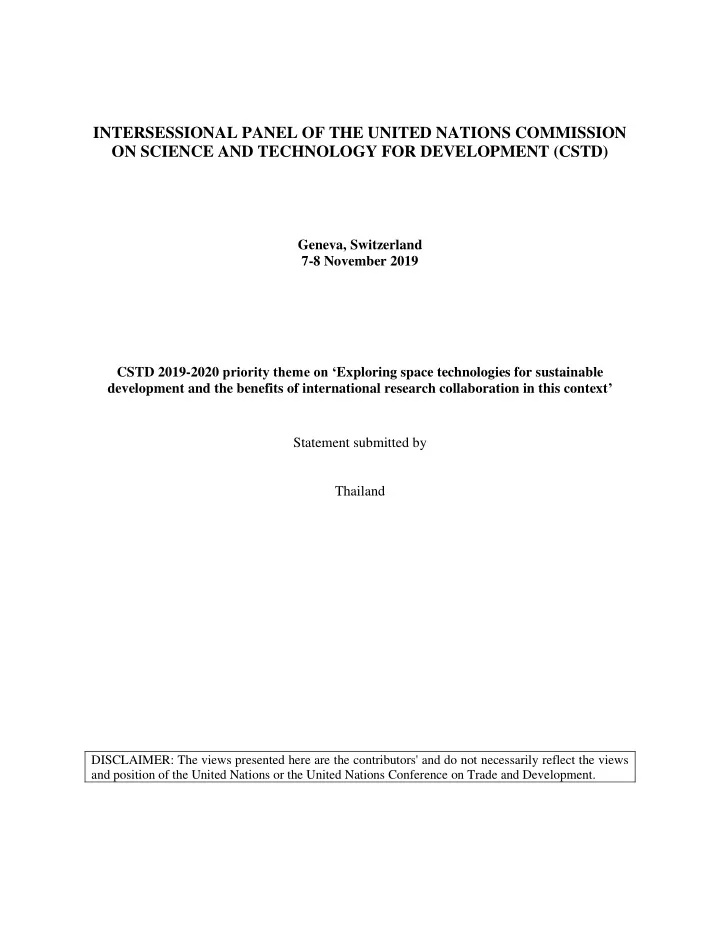

INTERSESSIONAL PANEL OF THE UNITED NATIONS COMMISSION ON SCIENCE AND TECHNOLOGY FOR DEVELOPMENT (CSTD) Geneva, Switzerland 7-8 November 2019 CSTD 2019-2020 priority theme on ‘ Exploring space technologies for sustainable development and the benefits of international research collaboration in this context ’ Statement submitted by Thailand DISCLAIMER: The views presented here are the contributors' and do not necessarily reflect the views and position of the United Nations or the United Nations Conference on Trade and Development.
The Statement of Thailand to Commission on Science and Technology Development, United Nations Conference for Trade and Development on Exploring space technologies for sustainable development and the benefits of international research collaboration in this context 7-8 November 2019 Geneva, Switzerland Mr. Chairman, Distinguish delegates, Ladies and gentlemen, I would like to take this opportunity to express our sincere thanks to the Commission on Science and Technology Development, UNCTAD to include the space technologies as a priority theme for the meeting this year. It reflects the fact that UNCTAD recognizes space technologies as a domain contribution to the sustainable development; which exactly meets the aim of the space actor community to work across sectors. Thailand also recognize space technologies as indispensable technologies for sustainable development. However, one of the deficiencies for investing in space program in developing country is that once the system was developed, further system enhancement and development is costly and cannot be performed without relying on the original supplier. Learning from the past, we are now focusing on developing our space capability of 1 of 4
the whole value chain from upstream to downstream. Moving toward sustainable development by balancing economic growth with social inclusion and, at the same time, protect the environment, downstream applications of space technologies need to be able to generate actionable intelligence providing multi-level user from policy-level to local users a deeper visibility and overall solutions to the targets areas. The Geo- Informatics and Space Technology Development Agency (GISTDA) as the main space agency responsible for space technology applications is developing the area-based innovation utilizing recent technological developments including machine learning and big data to help the Thai government to design and make decision appropriately and wisely on balance basis. It will be an ambitious end-to-end geo-information system supporting the Thai government in developing so called “Actionable Intelligence Policies”. The system will allow integrative host and leverage multi-source data for Thailand to conform with the global vision of the 2030 Agenda. The main challenge is the limitation of knowledge and geospatial experts who could transform space-generated data into SDGs- related insights. When mentioning space technology for SDGs, it does not mean to the applications of space technology only, but we also have to take the upstream of space technology development into account. The upstream are, for example, developing satellites, doing space researches. Thailand 2 of 4
has been developing infrastructure to facilitate space researches and space entrepreneur at Space Krenovation Park (SKP) to promote the development of upstream of space value chain. However, whilst the space technology could be an efficient tool contributing to sustainable development, upstream space technology development in developing countries itself has challenges, limited knowledge regarding trading and its regulations is one of those challenges. For instance, the start-ups in developing countries have limited knowledge on how to enter to space value chain; what are the regulations, practices and standards should be of their concerns. They need guidance. Another example is some dimension of space technology directly relates to security or military aspect. This would cause the difficulties in development of space technology for many countries due to the regulations of technology owner states. Thailand respect the role of UNCTAD in bridging between trade and development. We, therefore; propose to UNCTAD to support the trade and the development of space industry: We propose UNCTAD to study and share with members on the followings 1. the current space trade system in order to build up their capacity in dealing with space trade. 3 of 4
2. the barriers or obstacles of space trade, and hopefully, provide the guidance of which rules, procedures should be regulated or deregulated. 3. the benefits of trade in faring space countries and emerging space countries. We also propose UNCTAD to make a recommendation of investment in space, especially for developing nations. Thailand is also pleased to work with UNCTAD as well as other member states in this matter. Thank you. 4 of 4
Recommend
More recommend